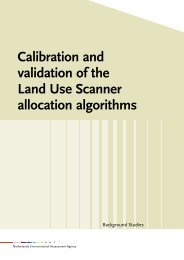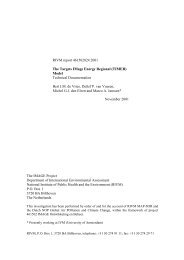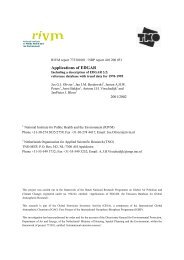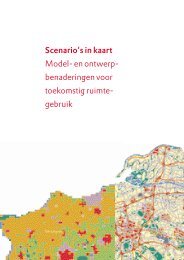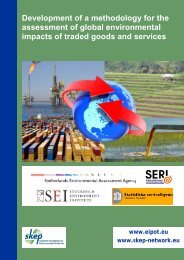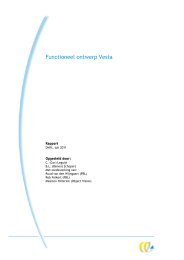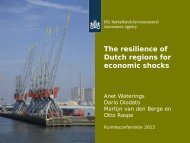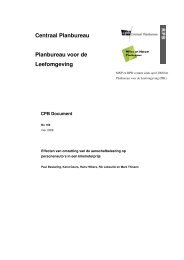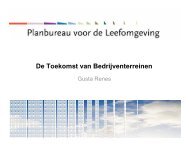Trends in global CO2 emissions - edgar - Europa
Trends in global CO2 emissions - edgar - Europa
Trends in global CO2 emissions - edgar - Europa
Create successful ePaper yourself
Turn your PDF publications into a flip-book with our unique Google optimized e-Paper software.
Summary<br />
Global <strong>emissions</strong> of carbon dioxide (CO 2<br />
) – the ma<strong>in</strong> cause<br />
of <strong>global</strong> warm<strong>in</strong>g – <strong>in</strong>creased by 3% <strong>in</strong> 2011, reach<strong>in</strong>g an<br />
all-time high of 34 billion tonnes <strong>in</strong> 2011. In 2011, Ch<strong>in</strong>a’s<br />
average per capita carbon dioxide (CO 2<br />
) <strong>emissions</strong><br />
<strong>in</strong>creased by 9% to 7.2 tonnes CO 2<br />
. Tak<strong>in</strong>g <strong>in</strong>to account an<br />
uncerta<strong>in</strong>ty marg<strong>in</strong> of 10%, this is similar to the per capita<br />
<strong>emissions</strong> <strong>in</strong> the European Union of 7.5 tonnes <strong>in</strong> 2011, the<br />
year <strong>in</strong> which the European Union saw a decrease <strong>in</strong><br />
<strong>emissions</strong> of 3%. Ch<strong>in</strong>a, the world’s most populous<br />
country, is now well with<strong>in</strong> the 6 to 19 tonnes/person<br />
range spanned by the major <strong>in</strong>dustrialised countries. In<br />
comparison, <strong>in</strong> 2011, the United States was still one of the<br />
largest emitters of CO 2<br />
, with 17.3 tonnes <strong>in</strong> per capita<br />
<strong>emissions</strong>, after a steep decl<strong>in</strong>e ma<strong>in</strong>ly caused by the<br />
recession <strong>in</strong> 2008–2009, high oil prices compared to low<br />
fuel taxes and an <strong>in</strong>creased share of natural gas.<br />
With a decrease <strong>in</strong> 2008 and a 5% surge <strong>in</strong> 2010, the past<br />
decade saw an average annual <strong>in</strong>crease of 2.7%. The top 5<br />
emitters are Ch<strong>in</strong>a (share 29%), the United States (16%),<br />
the European Union (EU27) (11%), India (6%) and the<br />
Russian Federation (5%), followed by Japan (4%). The fact<br />
that <strong>global</strong> <strong>emissions</strong> cont<strong>in</strong>ued this historical growth<br />
trend <strong>in</strong> 2011 seems remarkable at first sight, consider<strong>in</strong>g<br />
that <strong>in</strong> many OECD countries CO 2<br />
<strong>emissions</strong> <strong>in</strong> fact<br />
decreased – <strong>in</strong> the European Union by 3%, <strong>in</strong> the United<br />
States by 2% and <strong>in</strong> Japan by 2% – ma<strong>in</strong>ly due to weak<br />
economic conditions <strong>in</strong> many countries, mild w<strong>in</strong>ter<br />
weather <strong>in</strong> several countries and high oil prices. More<br />
important, however, is that CO 2<br />
<strong>emissions</strong> from OECD<br />
countries now account for only one third of <strong>global</strong><br />
<strong>emissions</strong> – the same share as that of Ch<strong>in</strong>a and India,<br />
where <strong>emissions</strong> <strong>in</strong>creased by 9% and 6%, respectively, <strong>in</strong><br />
2011. The <strong>in</strong>crease <strong>in</strong> Ch<strong>in</strong>a’s CO 2<br />
<strong>emissions</strong> was ma<strong>in</strong>ly<br />
due to a cont<strong>in</strong>ued high economic growth rate, with<br />
related <strong>in</strong>creases <strong>in</strong> fossil fuel consumption. This <strong>in</strong>crease<br />
<strong>in</strong> fuel consumption <strong>in</strong> 2011 was ma<strong>in</strong>ly driven by the<br />
<strong>in</strong>crease <strong>in</strong> build<strong>in</strong>g construction and expansion of<br />
<strong>in</strong>frastructure, as <strong>in</strong>dicated by the growth <strong>in</strong> cement and<br />
steel production. Domestic coal consumption grew by<br />
9.7% and coal import <strong>in</strong>creased by 10%, mak<strong>in</strong>g Ch<strong>in</strong>a the<br />
world’s largest coal importer, overtak<strong>in</strong>g Japan.<br />
Levels of <strong>global</strong> CO 2<br />
<strong>emissions</strong> from flar<strong>in</strong>g of unused gas<br />
dur<strong>in</strong>g oil production, which have decreased by about<br />
25% s<strong>in</strong>ce 2003, did not significantly change <strong>in</strong> 2011. They<br />
roughly amount to the total of CO 2<br />
<strong>emissions</strong> <strong>in</strong> Spa<strong>in</strong>.<br />
However, accord<strong>in</strong>g to satellite observations, flar<strong>in</strong>g<br />
<strong>emissions</strong> <strong>in</strong> the United States are on the rise, with a<br />
steep 50% <strong>in</strong>crease <strong>in</strong> 2011. The ma<strong>in</strong> cause is the recent<br />
sharp <strong>in</strong>crease <strong>in</strong> the country’s use of hydraulic fractur<strong>in</strong>g,<br />
or frack<strong>in</strong>g, for shale oil production and its ensu<strong>in</strong>g flar<strong>in</strong>g<br />
of co-produced gas. Recently, the United States also<br />
expanded shale gas frack<strong>in</strong>g and has now become the<br />
largest natural gas producer <strong>in</strong> the world.<br />
S<strong>in</strong>ce 2000, an estimated total of 420 billion tonnes CO 2<br />
was cumulatively emitted due to human activities<br />
(<strong>in</strong>clud<strong>in</strong>g deforestation). Scientific literature suggests<br />
that limit<strong>in</strong>g average <strong>global</strong> temperature rise to 2 °C<br />
above pre-<strong>in</strong>dustrial levels – the target <strong>in</strong>ternationally<br />
adopted <strong>in</strong> UN climate negotiations – is possible if<br />
6 | <strong>Trends</strong> <strong>in</strong> <strong>global</strong> CO 2<br />
<strong>emissions</strong>; 2012 Report




